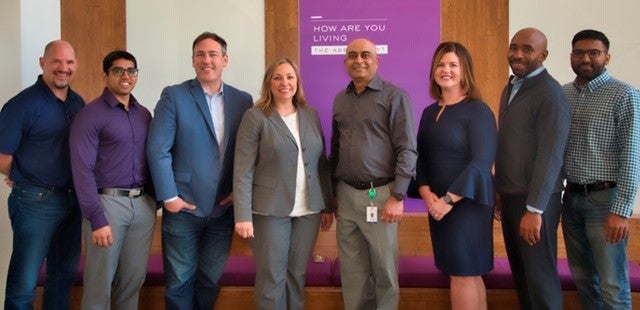AbbVie is a global pharmaceutical company that was formed in 2013 after a split from Abbott Laboratories. At the time of the split, AbbVie’s Legal Operations team had an opportunity to redefine their roles and take on new responsibilities in the new company. Recognizing that the ever-increasing amount of data gathered during e-discovery posed a continuing problem: Data processing spend was growing at an unsustainable rate. Every litigation matter required new forensic collections and data preservation, and that data would often need to be re-processed for subsequent litigation. The team’s initial foray into bringing those tasks in-house involved facilitating the separation of litigation data between Abbott and AbbVie. Then the true opportunity came just a few months later: two large, high-impact litigation matters, each of which would require the collection, processing, and hosting of data for several hundred custodians.
The team brought all of AbbVie’s data collection and data processing in-house. With the addition of a data processing platform and forensic examiners to the department, AbbVie e-discovery essentially became an e-discovery vendor inside AbbVie’s walls. The e-discovery group, a part of the 12-person Legal Operations function, has the company’s IP and commercial litigation teams as their main internal clients.
Having built up the necessary infrastructure for the Abbott/AbbVie data separation project, the team was well positioned to embark on an initiative that would save significant amounts of money and time by bringing those services in-house. An internal culture of “intrapreneurship,” empowerment, and encouragement paved the way; the initial phase of the project went from whiteboard to implementation within 8 months.
By mid-2015, AbbVie Legal Operations was performing e-discovery data processing tasks for all AbbVie litigation, performing forensic collections in conjunction with the internal IT department, then de-duplicating those new collections against legacy litigation data archives in order to create a single set of processed data that is ready to be uploaded for document review. While the shift to internal data processing was a substantial departure from proven, existing workflows, the e-discovery group focused on communication and transparency, so their internal litigation clients would know exactly what to expect. They also held themselves to a high standard.
“We knew that we had to offer a service level like that of previous outside vendors,” says Matthew Gasaway, Director and Senior Counsel of the group. “We wanted to minimize the effect of e-discovery costs on litigation decision making and make sure that our litigation teams didn’t have to worry about unexpected e-discovery spend impacting their budgets.”
The switch to internal data processing has resulted in an average avoided spend in excess of $2 million annually. Further, the group created a single, de-duplicated archive of each employee’s legacy litigation data that has streamlined AbbVie’s management and analysis of that data. During litigation, the e-discovery team can provide counsel with immediate information about the quantity and substance of litigation data it has for a specific employee in moments, assisting with early case assessment.
The team advises on these and other best practices in their dual role as internal consultants. “We advise on how best to improve legal hold practices, how to adapt the process to get the best results, and work to create metrics for our clients so they can watch efficiencies and trends,” explains Constance Mockaitis, Associate Director of the group. The group holds monthly meetings with the litigation teams to review best practices, general issues within e-discovery, and operational considerations.
Next, the Legal Operations team moved on to the second part of its two-pronged e-discovery cost problem: data hosting. Like many large companies, AbbVie maintained dozens of terabytes of document review databases with multiple providers, at a range of per-gigabyte rates. This resulted in such inefficiencies as paying to host multiple copies of duplicative data and made it difficult to ensure a consistent process for document review. Once again, the team issued an RFP to select a single data hosting provider.
AbbVie found that combining its databases made it possible to host all its litigation data at a single low fixed rate, resulting in decreased hosting spend even as its hosted data sizes doubled, providing an additional $2 million in annual savings and dramatically improving budget predictability.
But the benefits were more than financial: By aggregating its document reviews into a single hosted platform, AbbVie was able to publish and ensure adoption of a unified document review protocol, ensuring a consistent process for review, global de-duplication, and the use of advanced analytics.
“This solution allows our internal clients to focus on what’s important to them,” Mockaitis says.

L to R: David Berry, Shalin Patel, Matthew Gasaway, Jennifer Lagunas, Sam Ranganathan, Constance Mockaitis, Jarobi Kemp, Sutesh Patel